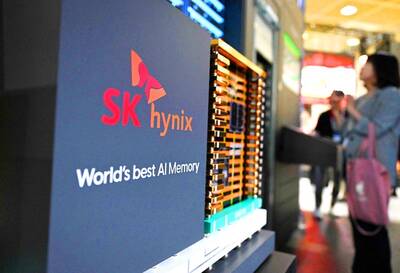Toshiba Corp yesterday said that three groups are vying for its memory chip business, as reports said Apple Inc has jumped into the race with a consortium offering to pay about US$20 billion for the unit.
The loss-hit conglomerate said bidders include a group led by US investment fund Bain Capital LP and Japanese state-backed investors, and another that includes Hon Hai Precision Industry Co (鴻海精密), better known as Foxconn Technology Group (富士康).
A third consortium includes Western Digital Corp, Toshiba’s US-based chip factory partner, which has tried to block any sale to a third-party in court.
Selling the profitable chip division is seen as key to cash-strapped Toshiba’s survival as one of Japan’s best-known firms struggles to plug multibillion-dollar losses at its US nuclear power division, Westinghouse Electric Co.
Toshiba did not mention Apple, which has joined the Bain-led consortium, according to reports in the Nikkei Shimbun and top-selling Yomiuri Shimbun.
Toshiba poured cold water on reports that it would make a final decision yesterday, saying it had been unable to reach a “mutually satisfactory definitive agreement with one of the consortia.”
It did not elaborate.
“The negotiation with each consortium has not reached the point which will allow Toshiba’s Board of Directors ... [to] make a decision regarding the sale” of the chip business, it added in a statement.
Talks would continue with possible bidders with an eye on a reaching a deal “at the earliest possible date,” it said.
Earlier reports said Bain brought Apple into the bidding group to stay in the running as Toshiba leaned toward a deal with Western Digital.
Apple relies on Toshiba’s memory chips for iPhones and iPods, and wants a continued supply so it is not dependent on rival Samsung Electronics Co, Bloomberg News said, quoting people familiar with the matter.
Toshiba is the world’s No. 2 supplier of memory chips, behind South Korean titan Samsung.
“There are supply shortages of that type of memory,” Canaccord Genuity analyst Michael Walkley said.
“They’re always looking to work closely with key suppliers and lock in long-term supply agreements,” he said.

Intel Corp chief executive officer Lip-Bu Tan (陳立武) is expected to meet with Taiwanese suppliers next month in conjunction with the opening of the Computex Taipei trade show, supply chain sources said on Monday. The visit, the first for Tan to Taiwan since assuming his new post last month, would be aimed at enhancing Intel’s ties with suppliers in Taiwan as he attempts to help turn around the struggling US chipmaker, the sources said. Tan is to hold a banquet to celebrate Intel’s 40-year presence in Taiwan before Computex opens on May 20 and invite dozens of Taiwanese suppliers to exchange views

Application-specific integrated circuit designer Faraday Technology Corp (智原) yesterday said that although revenue this quarter would decline 30 percent from last quarter, it retained its full-year forecast of revenue growth of 100 percent. The company attributed the quarterly drop to a slowdown in customers’ production of chips using Faraday’s advanced packaging technology. The company is still confident about its revenue growth this year, given its strong “design-win” — or the projects it won to help customers design their chips, Faraday president Steve Wang (王國雍) told an online earnings conference. “The design-win this year is better than we expected. We believe we will win

Power supply and electronic components maker Delta Electronics Inc (台達電) yesterday said it plans to ship its new 1 megawatt charging systems for electric trucks and buses in the first half of next year at the earliest. The new charging piles, which deliver up to 1 megawatt of charging power, are designed for heavy-duty electric vehicles, and support a maximum current of 1,500 amperes and output of 1,250 volts, Delta said in a news release. “If everything goes smoothly, we could begin shipping those new charging systems as early as in the first half of next year,” a company official said. The new

SK Hynix Inc warned of increased volatility in the second half of this year despite resilient demand for artificial intelligence (AI) memory chips from big tech providers, reflecting the uncertainty surrounding US tariffs. The company reported a better-than-projected 158 percent jump in March-quarter operating income, propelled in part by stockpiling ahead of US President Donald Trump’s tariffs. SK Hynix stuck with a forecast for a doubling in demand for the high-bandwidth memory (HBM) essential to Nvidia Corp’s AI accelerators, which in turn drive giant data centers built by the likes of Microsoft Corp and Amazon.com Inc. That SK Hynix is maintaining its